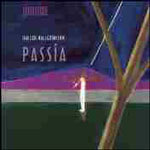
Passia
 $35.00
Out of Stock
$35.00
Out of Stock6+ weeks add to cart
HAFLIDI HALLGRIMSSON
Passia
Gardar Thor Cortes (tenor) Mary Nessinger (mezzo) / Motet Choir of Hallgrimskirkja / Chamber Orchestra of Hallgrimskirkja / Hordur Askelsson (cond
[ Ondine / CD ]
Release Date: Tuesday 10 August 2004
This item is currently out of stock. It may take 6 or more weeks to obtain from when you place your order as this is a specialist product.
"...absolutely spine-tingling and sound and graphic stereo separation, it sounds suspiciously like a modern religious masterpiece...Enthusiastically recommended."
Performance * * * * *
Sound * * * * *
- BBC Music Magazine, May 2004
"...absolutely spine-tingling and sound and graphic stereo separation, it sounds suspiciously like a modern religious masterpiece...Enthusiastically recommended."
Performance * * * * *
Sound * * * * *
- Calum MacDonald, BBC Music Magazine, May 2004
"Mary Nessinger and Gardar Thór Cortes...offer impassioned singing...Ondine's recording captures the spacious acoustic in vivid, high-impact sound."
Victor Carr Jr., ClassicsToday.com, October 2004, Artistic Quality 10 / Sound Quality 10
Icelandic composer Haflidi Hallgrímsson's Passía was commissioned by the Friends of the Arts Society of the church Hallgrímskirkja in Reykjavík, Iceland. It is a large-scale work for choir, soloists, orchestra and two organs that celebrates 1000 years of Christianity in Iceland. The premiere of the work took place in Hallgrímskirkja on February 18, 2001.
In Hallgrímsson's own words: "After reading a great deal of Icelandic 20th century poetry, which I felt could be used alongside verses from the celebrated Passíusálmar (Hymns of the Passion) by the great religious 17th century poet and priest Hallgrímur Pétursson - which I had always intended to use - I selected poems by Matthías Johannessen, Steinn Steinarr, Hannes Pétursson and Baldur Óskarsson, as well as a short prayer by the priest Bjarni Jónsson, who lived in the 17th century.
In the 20th century verses that I have set to music, one word, or a 'theme', reappears time and again: that of the vastness and mystery of the sea, as well as man's loneliness and difficulty in understanding the universe and his role within it.
The verses from Passíusálmar, on the other hand, deal with Christ's suffering on the cross, and in a terse but poetic language meditate on his seven words on the cross, his death and resurrection.
The noble and peaceful interior of Hallgrímskirkja (which is named after the poet), as well as the sensitive acoustics of the church, played an important part in the creation of Passía. In a sense, this work uses the church as an instrument, as a delicate sounding board for its mysterious content.
The word 'passía' (suffering) reoccurs throughout this large work like a refrain, reminding us constantly of its essence, inherent in the word, and how pain is gradually transformed through Christ's suffering, and eventual peace in death and resurrection.
Haflidi Hallgrímsson achieved international recognition for the highly successful Poemi for solo violin and string orchestra, awarded the prestigious Nordic Council Prize in 1986, as well as other prizes. Poemi has been followed by other works for soloist and string orchestra. Hallgrímsson's music shows a sensitivity to line and colour, shape and texture, which can undoubtably be traced in part to the composer's interest in the visual arts. Passía is his first composition for choir, orchestra and soloists.
Tracks:
1 13:55
2 7:17
3 7:05
4 14:35
5 17:56